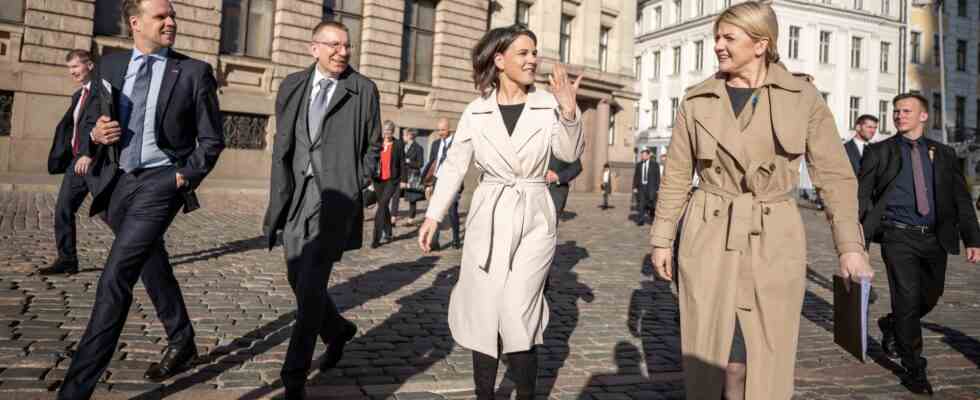analysis
Status: 21.04.2022 00:14
Foreign Minister Baerbock is traveling in the Baltic States for three days. On the first day of her trip, she acknowledges past German mistakes and promises more support to stop the Russian war in Ukraine.
“Annalena Berboka” reads the nameplate at the Foreign Ministry in Riga. The Federal Foreign Minister is sitting behind it in a blue velvet armchair. She’s so deep into it that her shoulders sag a little. She has just spent more than an hour talking about Ukraine with her Latvian colleague Edgars Rinkevics.
Baerbock seems concentrated. She reads almost all of the answers to the journalists’ questions from the manuscript she has prepared. Shortly after the new Russian offensive in Ukraine, the tension seems to be high.
Three days in the Baltics – for Federal Foreign Minister Annalena Baerbock that means three days of explaining what Germany is doing to stop the war in Ukraine. And above all to explain why it is no more.
War in Ukraine: Foreign Minister Baerbock holds talks in the Baltic States
Kerstin Palzer, ARD Berlin, daily news at 8:00 p.m., April 20, 2022
Fear of Russian aggression
The former Soviet republics of Latvia, Estonia and Lithuania are members of the EU and NATO, with direct borders to Russia or the Russian exclave of Kaliningrad. The fear of Russian aggression is great – not only since the current attack on Ukraine. Baerbock admits: Germany has long ignored these concerns and warnings. She wants to change that.
In the afternoon, Baerbock is standing with her Estonian colleague Eva-Maria Liimets and the two foreign ministers from Latvia and Lithuania in the “Little Guild” in Riga’s old town. Glass paintings behind the politicians are reminiscent of the German craftsmen who once met here. Baerbock invites German tourists to vacation in the Baltic States – one of the rare moments when the German foreign minister smiles and seems more relaxed.
Hardly any open criticism of the German attitude
Is Germany doing enough to protect NATO partners and Ukraine? This question determines Baerbock’s journey through the Baltic States. A clear answer cannot be given after the first day. Latvian Foreign Minister Rinkevics calls Germany a “trustworthy partner”. Everyone would give their maximum to support Ukraine. But he is also convinced that the federal government is looking for other ways to expand this support. This is how diplomats politely express that Germany must do more.
The Latvian Foreign Minister, his colleague from Estonia and the Lithuanian Foreign Minister Gabrielius Landsbergis are understanding. But their expectations can be guessed from their wording: it needs more to deter Russia from further attacks, such as air surveillance, coast guard ships and more soldiers. More than 1,000 German soldiers are currently stationed in Lithuania and Baerbock will visit them on Friday.
The Greens politician made a promise in Riga that people here like to hear: “The Baltic States can rely 100 percent on Germany.” Every corner of the NATO area will be protected together – as the NATO treaty also provides for.
More German weapons for Ukraine?
The Greens politician had recently spoken out in favor of Germany also supplying heavy weapons to Ukraine. A contradiction to Chancellor Olaf Scholz from the SPD? On Tuesday evening in Berlin, he tried again to explain why Germany hesitated to deliver heavy weapons to Ukraine. According to him, the possibilities of the Bundeswehr for this have reached their limits.
Baerbock argues similarly in the Baltic States. She emphasizes that Germany will supply systems to defend against Russian artillery fire. Armored vehicles are also not taboo. At the moment there is simply nothing that can be delivered quickly.
The Foreign Minister repeatedly emphasizes that Germany works closely with its partners. If they deliver to Ukraine, the Federal Republic can provide replacement, training and maintenance. Almost like a ring exchange. In addition, Germany is already providing support in Poland, Slovakia and Romania. Your list should probably convince critics: Is that nothing?
Foreign Minister practices German self-criticism
There is also criticism of German energy policy. Baerbock asks for understanding in the Baltic States: For an industrialized country like Germany, it is an effort to reduce its dependence on Russian oil and gas supplies. The Green politician calls the energy policy of the past few years “fatal”. She is self-critical, even though she and her party have only been in government for less than five months.
Here in the Baltic States one sees oneself confirmed. Resistance to the German-Russian Nord Stream 2 pipeline has always been great. According to Lithuania, it has not bought any more gas in Russia since the beginning of the month, and Latvia and Estonia intend to follow suit soon. And they expect the same from Germany – even if they don’t say it so clearly in front of the microphones and cameras in the festive hall of the “Little Guild”. Baerbock assures: The federal government is working on solving the dependency on Russia and is on the right track.
Learning from experiences in the Baltics
Baerbock will probably have to explain more often in the next few days what Germany is doing – at the upcoming talks in Estonia and Lithuania. And the Foreign Minister doesn’t just want to talk about weapons. It is a hybrid war that directly affects the Baltic States. Disinformation is part of everyday life.
Baerbock is clear at this point: “Russia’s nationalistic delusion leads to social division.” She therefore wants to listen and learn more from non-governmental organizations about the fight against disinformation and propaganda. Germany could learn a lot from the defensiveness of the Baltic States.
Foreign Minister Baerbock on consultations in Riga
Sofie Donges, ARD Stockholm, April 20, 2022 7:14 p.m

